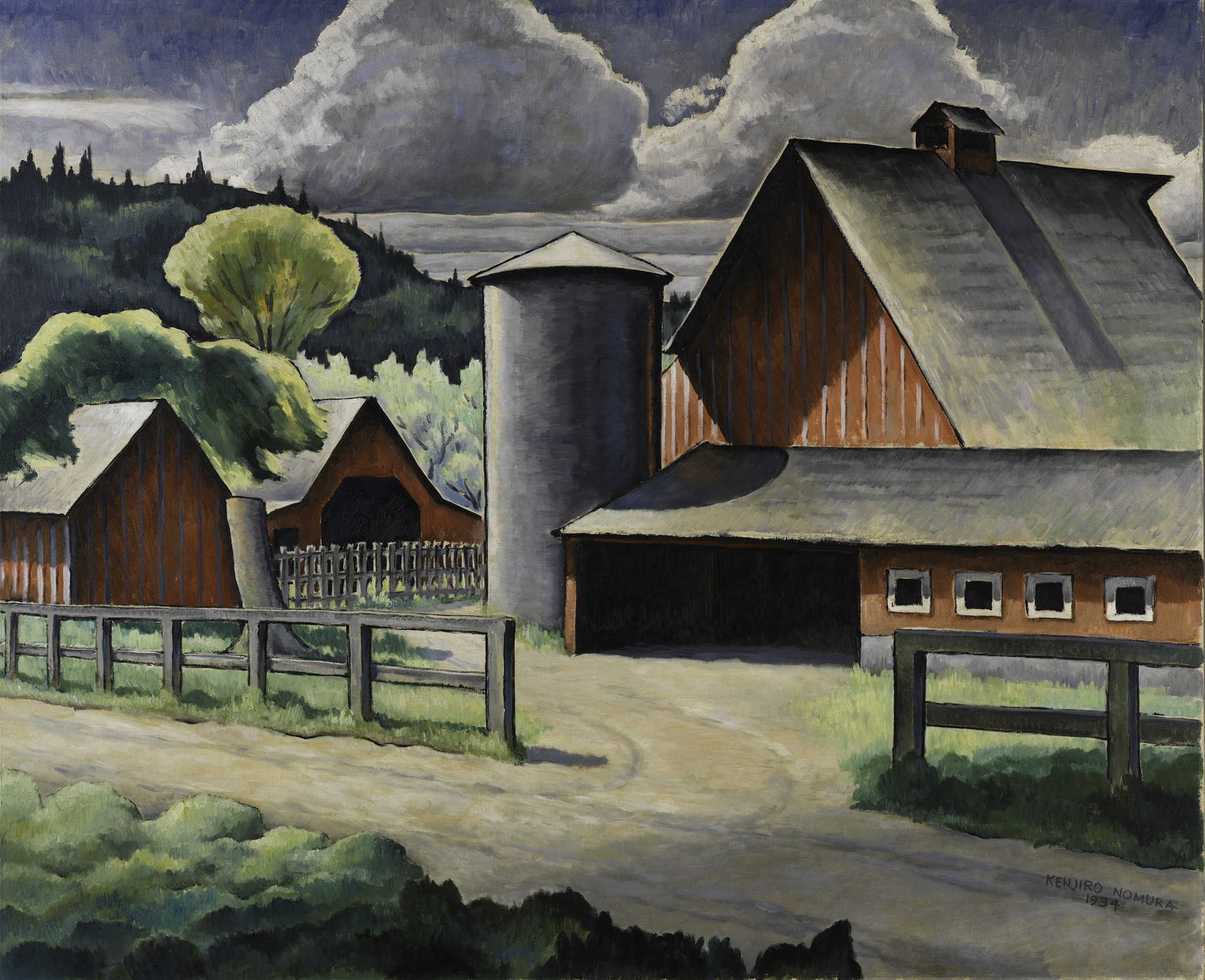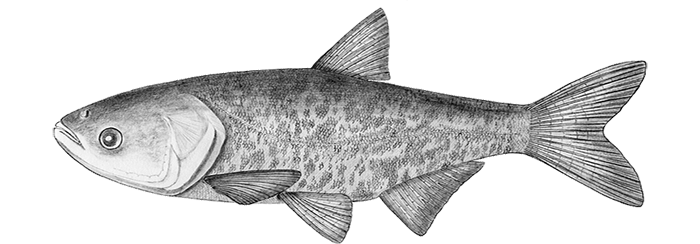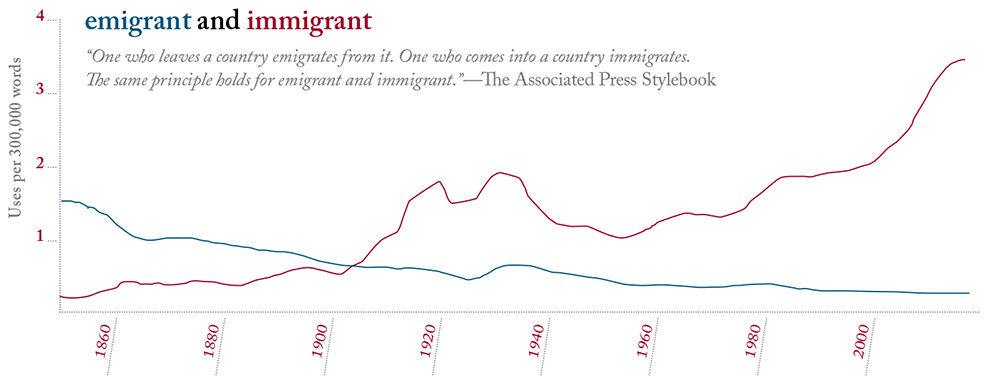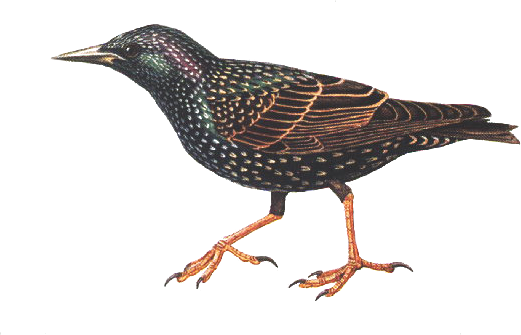
The Farm, by Kenjiro Nomura, 1934. Smithsonian American Art Museum, transfer from the U.S. Department of Labor, 1964.
alien: Belonging to another person, place, or family; not of one’s own; from elsewhere, foreign. “Any person not a citizen or national of the U.S. Noncitizen is a synonym.”—U.S. Citizenship and Immigration Services online glossary

Asian bighead carp
Brought from China in the 1970s to the lower Mississippi valley to rid sewage and aquacultural ponds of algae, weeds, and parasites, the carp escaped. By the late 1990s, Hypophthalmichthys nobilis became abundant in the Mississippi River drainage and now threatens Great Lakes fisheries. In 2014 the Minnesota state senate passed a measure that required state agencies to refer to the fish as “invasive carp.” The U.S. Fish and Wildlife Service changed its designation to “invasive carp” in April 2021.
asylum: Inviolable shelter; protection, spec. refuge in a nation other than one’s own, esp. as a political refugee; the right to claim this as defined or restricted in law by the nation concerned.
autochthon: A person indigenous to a country or region and traditionally supposed to have been born out of the earth or to have descended from ancestors born in such fashion. More generally, an indigenous person; an earliest known inhabitant.
Beringian Standstill: A hypothesis that during the last glacial maximum, a population of humans lived in genetic isolation on the Beringian landmass between Asia and North America for up to 15,000 years.
border surveillance: “Surveillance of borders between border-crossing points and the surveillance of border-crossing points outside their fixed opening hours in order to prevent persons from circumventing border checks.”—Practical Handbook for Border Guards (Schengen Handbook)
Cajun: A Louisianan descended from inhabitants of Acadia—a former French colony on the Atlantic Seaboard of North America—who were expelled starting in 1755.
Chicagoski: The fusion of Polish and English languages as spoken in Chicago by local Poles.
chiminage: A toll paid for liberty of passage through a forest. From Old French cheminage, right of way, from chemin, road; from Latin chiminagium.
dekasegi: 出稼ぎ (Japanese) Roughly, “working away from home.” The reverse migration of thousands of Japanese Peruvians (nikkei) who returned to Japan. Fewer than 1,000 nikkei lived in Japan in 1988; more than 31,000 did by 1992.
DP: (Abbr.) Displaced person. First use, 1944.
Drang nach Osten: (German) Lit., “pressure to the east.” A former German imperialist policy of expansion into Eastern Europe.
emigrant: One who removes from his or her own land to settle permanently in another. “The noise of embarking emigrants.”—Ralph Waldo Emerson, 1856

ethnic cleansing: Mass expulsion or killing of persons of a given ethnic or religious group to render an area ethnically homogeneous. From Serbo-Croatian etničko čišćenje.
exile: Prolonged absence from one’s native country or a place regarded as home. Partly from French and partly from Latin exilium, fact or condition of banishment; in postclassical Latin, also waste, ruin, destruction.
exody: A departure; a journey from any place.
expatriate: To withdraw from one’s native country; to renounce citizenship or allegiance. “The balance of sentimental commerce is always against the expatriated adventurer.”—Laurence Sterne, 1768
fellow traveler: A person who supports the communist movement without actually being a party member; a communist sympathizer.
foreign devil: A term of contempt for a foreigner (esp. a European) in China. From a translation of Mandarin yang guizi; formerly fan guizi.
founder effect: The loss of genetic variation that occurs when a new population is established by a single pair or by a single fertilized female.
hobo bag: A bundle used to carry a person’s belongings, made from a square of fabric with corners tied together, typically attached to the end of a stick and esp. associated with hobos. Also called a bindle (whence bindlestiff, a tramp who carries such a bundle).
horde: “A clan; a migratory crew of people.”—Samuel Johnson, Dictionary of the English Language
immigrate: To settle in a country that is not one’s own; to pass into a new habitat or place of residence.
immigrant smile: The facial expression of a person who has just come to America and smiles at everything.
indigene: A native. From Latin indigena, native, lit., “in-born person.”
issei: 世 (Japanese) Lit., “first generation.” A Japanese immigrant, esp. to the United States.
migra: (Spanish slang) U.S. Immigration and Customs Enforcement or other immigration law-enforcement agencies.
migrate: (Computing) To transfer data, programs, etc., from one environment to another.
Migration Age: A period of history in which large population movements took place, esp. the time of the major Germanic migrations, circa 200–600.
nisei: 二世 (Japanese) Of, relating to, or designating a person from America whose parents were immigrants from Japan. The third generation is called sansei. (Ichi, ni, san are Japanese for one, two, three.)
Pavee: A traveler, a member of Ireland’s nomadic ethnic minority.
Portagee colonial: Cheap furniture touted as fashionable and peddled to gullible recent immigrants.
refugee: A Protestant who fled France to seek refuge from religious persecution in the 17th and 18th centuries, esp. following the revocation of the Edict of Nantes in 1685.
stowaway: A person who hides in a ship in order to avoid paying for passage, to get to sea unobserved, or to escape by stealth from a country. First use, 1850. “A poor foreign immigrant who started scratch as a stowaway and is now trying to turn an honest penny.”—James Joyce, 1922
tramp: A bout of journeying on foot; a long, tiring, or toilsome walk or march; a trudge; on one’s way from place to place on foot, esp. in search of employment, or wandering as a vagrant.
Urheimat: (German) Lit., “original home.” In historical linguistics, the homeland of a protolanguage, where a language is spoken before it splits into different daughter languages.
vagrant: One of a class of persons with no settled home or regular work who wander from place to place and maintain themselves by begging or in some other disreputable or dishonest way.
viaticum: A supply of money or other necessaries for a journey; a sum to cover traveling expenses. From Latin viāticum, traveling money, provision for a journey.
wander: To move without fixed course or certain aim; to be in motion without control or direction; to roam, ramble, go idly about, with no fixed abode or station. “Multitudes wandering about they knew not whither, in quest they knew not of what.”—Samuel Johnson, 1750
wetback: (Derog.) An illegal immigrant who crosses the Rio Grande from Mexico to the U.S. First use, 1920.
zainichi: (Japanese) A foreign citizen in Japan. In 2017 Chinese were the largest ethnic minority in Japan (31 percent of all registered foreigners), followed by Koreans (20 percent) and Filipinos (10 percent).

Zugunruhe
(German) Lit., “migratory restlessness.” “European starlings in Europe migrate south in the fall (though many or most of those now in Vermont and Maine do not), at which time they enter a state of restlessness. Gustav Kramer, the German ornithologist who coined the word Zugunruhe, first noted this behavior in his caged starlings, which were agitated and hopping around in their cages in the spring and tended to orient northeast. They oriented in the correct migratory direction when the sun was out, but as soon as the sky was clouded, they no longer oriented in any one direction.”—Bernd Heinrich, The Homing Instinct, 2014